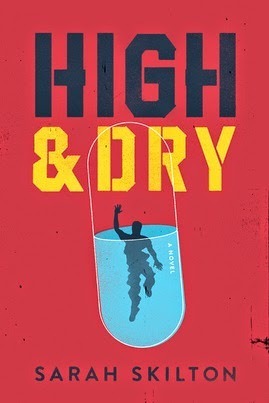Writing lessons learned from HIGH AND DRY

I recently read High and Dry, a noir YA novel by Sarah Skilton. It was a fun, dark, gritty read. Full disclosure: Sarah Skilton is a buddy of mine. But believe me, I'm not saying nice things about the book because Sarah's my friend. I speaketh kind words because they're the truth.
First, a quick look at High and Dry (from Amazon):
Framed for a stranger's near-fatal overdose at a party, blackmailed into finding a mysterious flash drive everyone in school seems anxious to suppress, and pressured by his shady best friend to throw an upcoming match, high school soccer player Charlie Dixon is juggling more than his share of drama. Add in a broken heart and the drinking he's been doing to soothe it, and he's near the breaking point. In this fast-paced, layered mystery, Charlie spends a frantic week trying to clear his name, win back the girl of his dreams, and escape a past friendship that may be responsible for all his current problems.
Now on to the writing lessons learned. Warning: if you haven't read the book yet, and don't want to know any plot points, read no further!
Begin with voice and character: Skilton's novel begins with a great first line. "I wasn't invited, but I showed up to the party anyway so I could talk to Ellie Chen and find out why she dumped me two weeks ago." Already we know the main character has attitude, and that he doesn't mind breaking rules.Create empathy for the anti-hero: Charlie Dixon's internal dialogue makes readers care for him. Yes, he's drinking. Yes, he crashed a party. But we know why--his heart is broken because of a bad break up. Teens (and most adults) can totally relate.Motive for blackmail: Blackmail happens, and in fiction, it has to be totally believable. Why would someone blackmail Charlie Dixon? His mom was tasked with school reform and become Enemy #1 in their small desert town. This may or may not be the real reason why Charlie is blackmailed, but he assumes it has something to do with his current predicament.Fun slang for only this story: Skilton came up with fun terms used by kids at the high school. Cliques within the school were known as Song Birds (girls' choir), Dot Govs (student council), and Beckhams (soccer players), to name a few. Skilton wrote a great post over at Janice Hardy's blog about Slinging Slang: The Case for Made-Up Words.Believable reason to do the wrong thing: Charlie Dixon does many questionable things, but these actions make sense in context. Characters do bad things all the time, and if the reasons are believable, the reader will forgive them--and even root for them.Create a cast of suspects: Sheesh, Skilton's book was packed with suspects. Even walk-on characters had dirt under their nails, which kept things interesting.Have you read High and Dry yet? What's your opinion on these writing lessons? Have you used any of these tips before? Any you'd like to add?
Published on June 18, 2014 04:00
No comments have been added yet.



